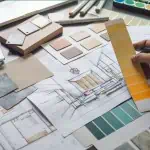What skills are needed to be an interior designer?
December 20th, 2022
Design Careers
The interior design industry is exciting, fast-paced and very lucrative. Spanning from one-room domestic jobs to vast, multi-space commercial projects, if you have the skills to thrive in this field, there is plenty of money to be made. However, what exactly are the capabilities needed to excel as an interior designer?
In this guide, we take a look at the essential skills interior designers need to master to succeed. From trend identification expertise to technical design competencies, this blog will also look at the specialist design courses that can help you hone these skills.
What skills are required to be an interior designer?
There are a range of skills you need to be able to display in order to thrive as an interior designer. From trade-specific skills like creativity and technical design abilities to more generalised competencies such as strong communication and budgeting skills, learning and honing these abilities can take time and a lot of practical experience. There are also training courses and qualifications available to make this development process easier. However, before we look at these courses in more detail, below we outline the top traits, characteristics and skills needed to become a successful interior designer.
Creativity
Although it almost goes without saying, you must be a creative person to be an interior designer. Professionals in this field must be able to visualise the potential of the space they are working with. This is to say, you need the ability to concentrate on both the big picture and the little details that will help to make your grand vision a reality. Without the creativity and imagination to do this, working as an interior designer is impossible.
Well-honed design skills
You must be able to translate your ideas into tangible designs as an interior designer. You can be the most creative person in the world, however, if you are unable to do this, you will struggle in this industry. This is why technical design skills are so essential in this field.
There are two components of technical interior design. These are technical drawing and computer-aided design (CAD). Hand-drawn sketches are important as they are usually what makes up the initial stages of a project. They can be used to present your ideas in a rough yet accurate way. CAD is then used to provide a more accurate visual representation of your concepts.
Both of these skills can be self-taught. However, formal training is often the better option. Design courses can help you to develop a comprehensive understanding of technical design, while also training you to use the industry-specific design software you will need to do your job.
Trend identification skills
Design trends are always evolving. This means, in order to be a successful interior designer, you need to be able to identify trends. This allows you to stay ahead of the curve and at the vanguard of your profession.
Only by keeping your finger on the pulse of ever-changing interior trends are you able to stand out from the crowd. However, it’s important to remember that not all trends are new. Like many art forms, interior design is cyclical. This means it’s important to familiarise yourself with classic interior design styles as well as trying to predict bold new trends. Indeed, you might be surprised how many contemporary trends are inspired by classic stylings.
Organisation and administration skills
Organisation skills are essential for interior designers. This project-based profession requires work to be completed on time and in a well-ordered manner. After all, if you are not able to deliver in the timescale you initially outlined to the client, it is unlikely they will use your services again. For this reason, planning every day’s work meticulously is key in this trade. While unexpected and unavoidable delays will always be a factor, it’s important that you are organised enough to plan ahead of time. Even if this means being conservative with your completion dates – it’s better to deliver early than late!
Great communication skills
From builders to suppliers, successful interior designers work with a variety of traders. This means strong communication skills are a must. Of course, it’s not only fellow tradespeople designers have to communicate with. They also need to be able to communicate their design vision with their clients.
While these skills come more naturally to some, communication skills can be honed. This could include making an effort to meet face-to-face with clients, rather than communicating over email, for example.
Budgeting skills
Sticking to a budget while still delivering everything you promised is a key skill for any interior designer. This is an ability that is more difficult to master than it sounds. Both flexibility and discipline are essential when it comes to budgeting. You never know when you might have to change suppliers at the last minute, for example. Or alter designs after the price of an essential material increases unexpectedly.
The ability to successfully negotiate with suppliers to minimise costs is also important. To do this, problem-solving skills and pragmatic decision making in the face of potential change are important traits.
How to improve interior design skills
You’re not required to undertake any formal training to become an interior designer. That being said, qualifications are a great way to improve your skills. Taught by industry experts, courses such as ICI’s interior design programme can turn your raw talent into the well-honed design skills needed to succeed in this field. In as little as 24 weeks, students can refine their skills and gain an industry-recognised diploma in interior design.
Interior design courses are usually broken up into individual units of study. This ensures a wide range of different essential skills can be covered. From basic principles of decorative design to technical drawing and CAD skills, a diploma in interior design can make you a more rounded, skilled designer.
Online, career focused education that suits your lifestyle.
See our coursesGladys Mae serves as the General Manager and Head of Student Services at the International Career Institute. Gladys holds a degree in Mass Communication - Broadcast Media from the University of San Jose-Recoletos. She joined ICI in 2010 and has over the past 12 years been instrumental in providing leadership and guidance to staff and students alike. Prior to joining ICI Gladys led a multifaceted career with key roles in the banking and business process outsourcing industries.









